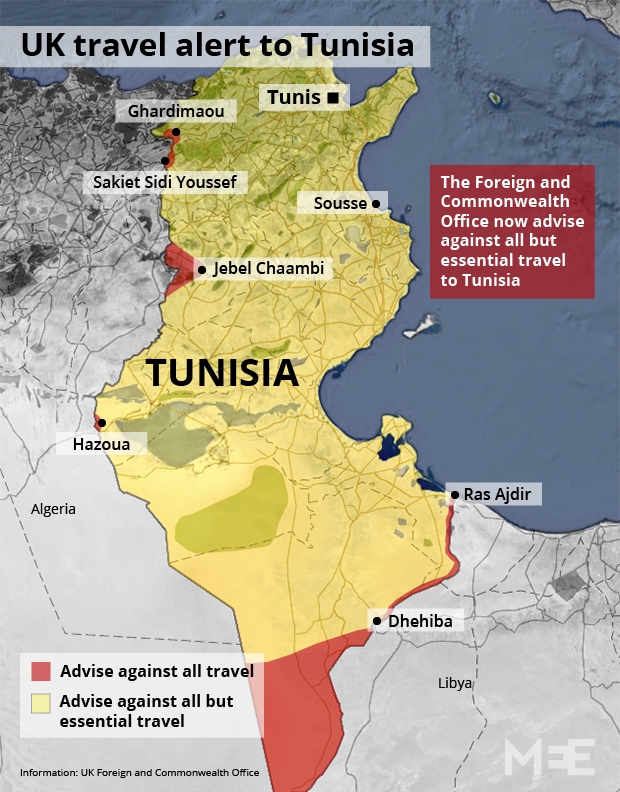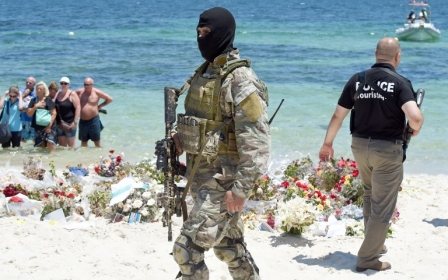Foreign Office tells British tourists to leave Tunisia

Britain on Thursday advised its nationals in Tunisia to leave, warning local authorities could not provide "adequate protection" after last month's beach massacre in which 30 Britons were killed.
"Although we have had good co-operation from the Tunisian government, including putting in place additional security measures, the intelligence and threat picture has developed considerably, reinforcing our view that a further terrorist attack is highly likely," the Foreign Office said.
"On balance, we do not believe the mitigation measures in place provide adequate protection for British tourists in Tunisia at the present time and we have therefore changed our travel advice accordingly."
The Foreign Office had previously advised against travel to certain hotspots, including near the borders with Algeria and Libya, but now urged Britons to keep away from the whole of the country unless they have essential business.
"The FCO advise against all but essential travel to the rest of Tunisia. If you're in Tunisia and you don't have an essential need to remain you should leave by commercial means," the ministry said in online travel advice.
It said that tour operators would be arranging additional flights to bring tourists home to Britain.
The warning comes almost a fortnight after a Tunisian student went on a rampage at a popular beach resort, killing 38 foreign tourists including 30 Britons. It was the worst militant attack on Britons since the 2005 London bombings.
Tunisia officials decry travel advice
The Foreign Office’s decision raised the ire of several Tunisian officials, with the Prime Minister Habib Essid saying that he would telephone David Cameron on Friday.
Nabil Ammar, the Tunisian ambassador to the UK, denounced the change in travel advice, saying that this is “what the terrorists want”.
Ammar also pointed out the impact this would have on Tunisia’s tourism industry, which the country heavily relies on.
“By damaging the tourism, by having foreigners leaving the country, they damage the whole sector and put so many people out of work and on the streets,” Ammar told BBC Newsnight. “Hotels have to close and this is an important industry.”
“One of the sources of terrorism is lack of hope,” he added. “It is not the only motor of it but it is one of the very important origins.”
Tour operators have already begun working on bringing home British citizens, with Thomas Cook stating that they will bring home 2,000 British and Irish holidaymakers currently on resorts in Tunisia back on 10 flights scheduled for the weekend.
Following the government’s travel advice, Thomson and First Choice cancelled all flights to Tunisia for the summer season.
In a statement, they said “as a precautionary measure we have taken the decision to repatriate all British Thomson and First Choice staff currently working in Tunisia within the next 24 hours.”
Tunisian President Beji Caid Essebsi on Saturday decreed a state of emergency in the North African country for 30 days, and Prime Minister Habib Essid said on Wednesday that the government feared more attacks.
"We would not have felt obliged to decree the state of emergency if we were not convinced that our country was facing numerous terrorist plans to destabilise the country," he told parliament.
As part of the new security measures, Tunisia announced that it would build a wall with neighbouring Libya where many Tunisian militants have received training.
Tunisia stepped up security around tourist sites in the wake of the 26 June shootings, the second attack on tourists there in three months. Both were claimed by the Islamic State (IS) group.
The Foreign Office said: "The Tunisian authorities have increased their security measures but have also acknowledged the limitations in their ability to counter the current terrorist threat."
About 20,000 British tourists were on package holidays in Tunisia at the time of the attack, according to ABTA, the country's largest travel association.
Thousands chose to return home after the shooting, although some chose to stay and show solidarity with local Tunisians, some of whom tried to fight the gunmen and formed human shields to prevent him from killing tourists. Tourism is a key source of revenue and jobs in Tunisia but has struggled in recent years due to regional uncertainty.
Stay informed with MEE's newsletters
Sign up to get the latest alerts, insights and analysis, starting with Turkey Unpacked
Middle East Eye delivers independent and unrivalled coverage and analysis of the Middle East, North Africa and beyond. To learn more about republishing this content and the associated fees, please fill out this form. More about MEE can be found here.





